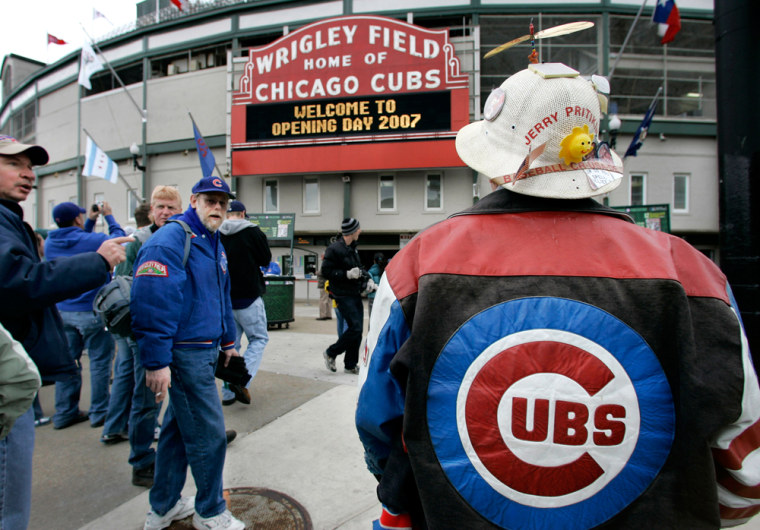For 100 inglorious years, since their last world championship, the Chicago Cubs have defined futility on the baseball field. These days, team ownership is showing a similar strain of ineptitude off the field.
Considering the Cubs are an iconic franchise, play in a historic ballpark, perform in a large market and sell out almost every game whether they finish 66-96 or 96-66, the inability to sell the team – which has been on the market since Sam Zell bought Tribune Co. more than a year ago – is nothing short of astounding.
One wonders if former hapless Cub managers such as Jim Marshall or Lee Elia have taken control of the process. The lapses in judgment make Cubs shortstop Leonard Merullo’s four errors in one inning in 1942 look like a Golden Glove moment.
Consider:
- Zell wants to sell the franchise and Wrigley Field separately, believing he'll make more money that way (up to $1 billion he hopes), but the decision also diminishes the number of interested bidders in the team. Cleaving the Cubs from Wrigley Field is like removing a do-nothing Congressman from Capitol Hill; he is of little worth to the world without his inspiring surroundings. Without Wrigley, the Cubs might as well be the Tampa Rays. Who will want to buy the team and its spiraling salaries without a piece of the crown jewel, Wrigley Field?
- The idea floated this winter of selling the park to the Illinois Sports Facilities Authority (ISFA), which also runs U.S. Cellular Field for the White Sox, generated an uproar. ISFA Chair James Thompson, former Illinois governor, quickly proposed a $400 million renovation of Wrigley, which would mean abrogating Wrigley's landmark status. The park received this status for one reason: it's truly a landmark, meaning its character can't be destroyed by turning, say, the right-field bleachers into the Hostess Ho Ho Pavilion, complete with a scoreboard-sized cupcake.
- Zell and another Cubs executive suggested that Wrigley, the chewing gum concern, should pay for having its name grace the ballpark. First, it's not like the Wrigley company has ever featured Wrigley Field in television commercials. No ads for spearmint gum adorn the concourses, and the Doublemint Twins don't hand out sticks to fans. In the minds of the public, the Wrigley association is tied to the family, who ran the team from the 1920s into the 1980s. It's like a neighbor, after letting the guy next door use his lawnmower for decades, deciding to charge for the privilege (the Tribune Tower, after all, is right across the street from the Wrigley Building on Michigan Avenue in Chicago).
The list goes on.
Experts scratch their heads at the idea of splitting up the franchise and the stadium. “The only way the team can earn a high sale price is if the owner has some control over the stadium,” said Patrick L. Anderson, principal and CEO of Anderson Economic Group in Chicago, who estimates the Cubs’ value at more than $600 million without Wrigley. “The team owner doesn’t have to own the stadium outright, but the stadium is such a part of the Cubs business — and a key part of Cubs lore — that nobody would buy the team without knowing how the stadium fits in.”
Aside from the Wrigley naming-rights gaffe, Tribune is also suggesting that the ISFA could make millions by selling naming rights to another corporation, which would only guarantee the buyer fewer customers among Cubs’ fans. After a quarter-century with the team – which coincided with popular promotions and endless sellouts, including a record 3.3 million in attendance in 2007 – John McDonough left the Cubs to market the floundering Blackhawks (and did a superb job in a few months, putting homes games on television and honoring former stars such as Bobby Hull and Stan Mikita). The Cubs are demanding more night games, looking to amend an agreement with the city that is supposed to last until 2016.
Tribune has received quite a bit of criticism during its 27-year reign as team owners, but truthfully, aside from the lack of a World Series appearance, its stewardship had been stellar until Zell took over. The company added seats in a non-obtrusive manner, installed lights and invited a few sponsors inside the hallowed field, but the park retains its unique charm, which is proven by its record-setting attendance every year. The ivy will sprout on the outfield wall later this spring, and the hand-operated scoreboard chugs along. Gabby Hartnett would still feel at home – except when he heard about player pay. Tribune has dedicated well over $100 million in salaries this season – including $12 million to lure Kosuke Fukudome from Japan – to try to capture a World Series title for the first time since the Teddy Roosevelt presidency.
Though Tribune originally hoped to sell the Cubs and Wrigley Field after the 2007 season, it looks like the 2008 campaign will pass before any deal is struck. There’s no doubt the two parts will, ultimately, bring in hundreds of millions of dollars beyond Tribune’s purchase price of $20.5 million in 1981. Zell, a real-estate mogul, may survive this boorish sales job. Yet fans can only remain stunned that a 94-year-old ballpark and a 132-year-old franchise can be disposed of without affection, in a manner similar to the 15 Cub managers who have been tossed from Wrigley in the past quarter century.
